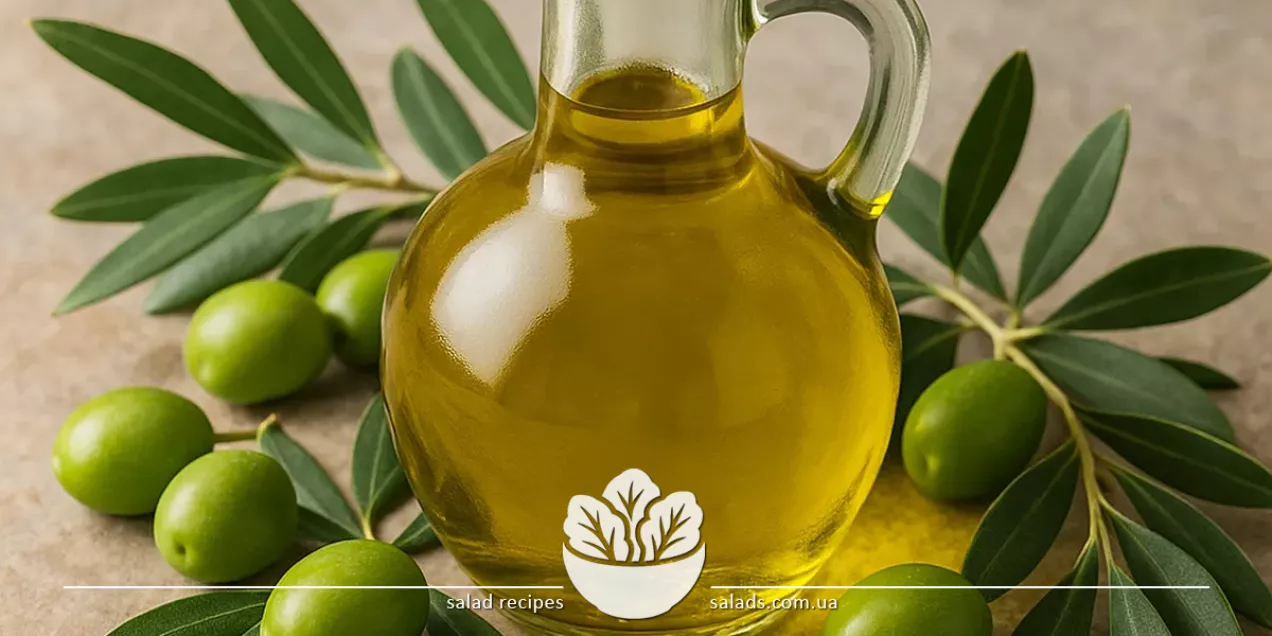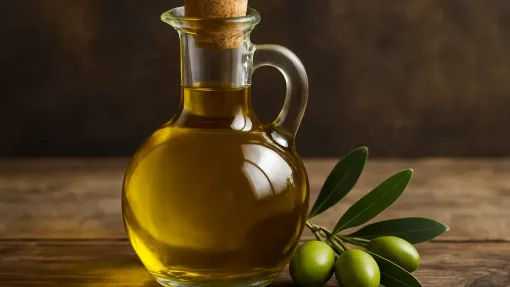Olive Oil

Olive oil is a natural product derived from the fruit of the olive tree and is one of the main ingredients in Mediterranean cuisine. It is renowned for its health-promoting properties and unique flavor. Among the category of oils, olive oil stands out as a high-quality and popular product due to its rich composition of nutrients. Knowing the varieties and features of olive oil helps you use it properly in cooking and for maintaining health.
Types of Olive Oil
Types of Olive Oil and Their Features
Olive oil comes in several main types, differing in production methods and quality. The highest quality is extra virgin oil – obtained by cold pressing without chemical treatment, retaining maximum nutrients and rich flavor. Virgin oil is also cold pressed but has a slightly higher acidity level and a milder flavor profile. Refined oil undergoes additional processing to remove impurities and odor, so it has a more neutral taste and lighter color. It is often blended with extra virgin oil to achieve moderate quality at a more affordable price. There are also varieties with different aromatic notes – fruity, bitter, herbal – allowing you to choose the best option for specific culinary tasks. The type of olive oil you choose affects the taste and nutritional value of a dish. For example, extra virgin oil is better for salad dressings, while refined oil is suitable for frying due to its higher smoke point. Using high-quality oil enhances the flavor of other ingredients, such as garlic or sweet pepper, making the dish harmonious and aromatic.
Health Benefits of Olive Oil
Olive oil is rich in monounsaturated fats, which help reduce “bad” cholesterol levels and support cardiovascular health. It contains antioxidants, especially polyphenols, that help protect body cells from damage, slow the aging process, and reduce the risk of chronic diseases. Olive oil consumption improves brain function, reduces inflammation, and supports the immune system. It also positively affects digestion by promoting better absorption of nutrients and normalizing metabolism. Regular consumption of olive oil is associated with healthier skin and a reduced risk of developing diabetes. Due to its properties, olive oil is recommended as part of a balanced diet, especially in Mediterranean countries where it is the primary source of fat. It pairs well with vegetables like peas and fish, such as tuna, making dishes both tasty and healthy.
Using Olive Oil in Cooking
Olive oil is a versatile ingredient widely used in preparing salads, sauces, marinades, and even for frying. Thanks to its flavor and aroma, it enhances the natural taste of food and adds refinement to dishes. Extra virgin oil is ideal for salad dressings and finishing dishes, preserving all its beneficial properties. For cooking at high temperatures, refined oil is preferred, as it has a higher smoke point and retains its quality when heated. Olive oil pairs wonderfully with vegetables, especially eggplants, making it popular in various world cuisines, particularly Mediterranean. In addition, it is used in baking and desserts, where it replaces butter or other fats, adding lightness and nutritional value. Combining it with ingredients such as cabbage or garlic creates unique flavors and aromas.
How to Store Olive Oil to Preserve Its Quality
To retain the beneficial and flavor properties of olive oil, proper storage conditions are important. Oil should be kept in a cool, dark place, away from direct sunlight and high temperatures. The optimal storage temperature is between 14 and 18 degrees Celsius. It's essential to use tightly sealed dark bottles to minimize contact with oxygen and light, which slows down oxidation and rancidity. An opened bottle should be consumed within a few months to avoid loss of aroma and nutrients. Improper storage conditions lead to reduced oil quality – it may become cloudy, develop an unpleasant smell, or taste bitter. Following simple rules will help maintain the freshness, health benefits, and pleasant flavor of olive oil over time.
Health Properties of Olive Oil and Consumption Tips
Olive oil is a valuable source of monounsaturated fats that help reduce the risk of cardiovascular disease, support healthy cholesterol levels, and improve brain function. It contains powerful antioxidants, including polyphenols, that fight free radicals and reduce inflammation in the body. It is also rich in vitamins E and K, which support skin, bone, and immune health. Regular use of olive oil improves digestion, normalizes metabolism, and helps maintain energy balance. To preserve its health benefits, it is best to consume olive oil raw – add it to salads, side dishes, and ready-made meals. Keep in mind that moderation is important, as the oil is quite calorie-dense. It can be paired with various foods, such as tuna or peas, enhancing flavor and contributing to a balanced and healthy diet. Olive oil is an essential component of a wholesome diet that helps maintain youth, energy, and overall well-being.
